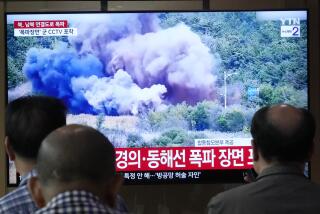North Korea appears to conduct nuclear test, defying world powers
BEIJING -- North Korea appeared to conduct a nuclear test Tuesday in defiance of world powers, South Korean officials said, following through on the provocative step after weeks of threats.
South Korea said it had detected a man-made seismic event across its northern border.
“South Korean National Weather Service confirmed an artificial earthquake of 4.9 magnitude,” said Kim Min-seok, a spokesman for the South Korean Defense Ministry.
Kim said the blast was measured at 6 to 7 kilotons.
If confirmed, it would mark the third nuclear test for North Korea. It comes on the heels of its launch in mid-December of a multistage rocket that put a small satellite into orbit. The technology for a satellite launch is similar to that of an intercontinental ballistic missile, with the main difference being the type of payload it carries.
Experts believe North Korea is still far from making a nuclear weapon that can reach Alaska (or any other part of the United States) but that it is making strides quickly. Their satellite launch in December surprised observers with the accuracy of the orbit it achieved, although the transmission system carried by the satellite apparently failed.
From a technical standpoint, North Korea’s next challenge is to make a nuclear warhead small enough to be mounted on a missile.
The North Koreans have said their nuclear and missile programs are directed against the United States, the “archenemy of the Korean people,’’ as they put it in a recent pronouncement. They said the current test was necessitated by the expanded sanctions imposed by the U.N. Security Council at the urging of the U.S.
“It is a lame excuse,’’ said Daniel Pinkston of the International Crisis Group in Seoul. “Nuclear capability is something they want, something they feel they need. It fits into their entire doctrine.”
Tibor Toth, executive secretary of the Comprehensive Nuclear-Test-Ban Treaty Organization in Vienna, said his organization had “picked up evidence of an unusual seismic event” in North Korea.
“The event shows explosion-like characteristics and its location is roughly congruent with the 2006 and 2009 . . . nuclear tests. For now, further data and analysis are necessary to establish what kind of event this is,” Toth said.
“If confirmed as a nuclear test, this act would constitute a clear threat to international peace and security, and challenges efforts made to strengthen global nuclear disarmament and nonproliferation, in particular by ending nuclear testing.”
South Korea’s Yonhap news agency reported that North Korea on Monday notified China and the U.S. about its planned test.
The tremor occurred deep in the mountains of North Hamgyong province, near the village of Punggye-ri about 80 miles from the Chinese border, according Yonhap.
It could be some days before scientists know how large or what type of nuclear device was detonated. The last two North Korean nuclear tests, in 2006 and 2009, used plutonium from the now-closed nuclear reactor at Yongbyon, but the country also has a program to make highly enriched uranium.
If in fact North Korea has mastered the production of highly enriched uranium -- which is made with centrifuges -- it could have access to a much larger reserve of fissile material than previously thought. Highly enriched uranium programs are also easier to conceal in underground tunnels or caves, out of sight of weapons inspectors and spy satellites.
Experts believe North Korea has from 24 to 42 kilograms of plutonium, which would be enough to make four to eight bombs like the one dropped on Nagasaki, Japan, in World War II.
The North Korea nuclear test is another irritant in unsettling times in Northeast Asia, where China is sparring with neighbors over islands and Japan is debating whether to revise its pacifist post-World War II constitution.
China’s admonishments against the North Korean weapons program have been more assertive than in the past. A test now, during Chinese New Year celebrations, is likely to be considered particularly provocative by Beijing. There was no immediate comment from China.
“If North Korea engages in further nuclear tests, China will not hesitate to reduce its assistance to North Korea,’’ warned the Global Times, a newspaper affiliated with the Chinese Communist Party, in a recent editorial.
In the international community, there has been much disappointment that North Korea’s new leader, 30-year-old Kim Jong Un, is following the same course as his father, the late Kim Jong Il, who made the weapons program the centerpiece of his regime.
“Although there has been talk of change within North Korea society with this young leader, through the last year there has been no sign -- no change in the way the budgets are spent, the laws or education -- to back it up,’’ said Park Syung-je, a North Korea analyst with the Seoul-based Asia Strategy Institute. “Nothing has changed.’’
ALSO:
Scandal, speculation surround past popes who resigned
Car bomb on Turkish-Syrian border kills 10, injures dozens
Pope Benedict XVI to become first pope in 600 years to resign
Special correspondent Jung-yoon Choi in Seoul contributed to this report.
More to Read
Sign up for Essential California
The most important California stories and recommendations in your inbox every morning.
You may occasionally receive promotional content from the Los Angeles Times.











